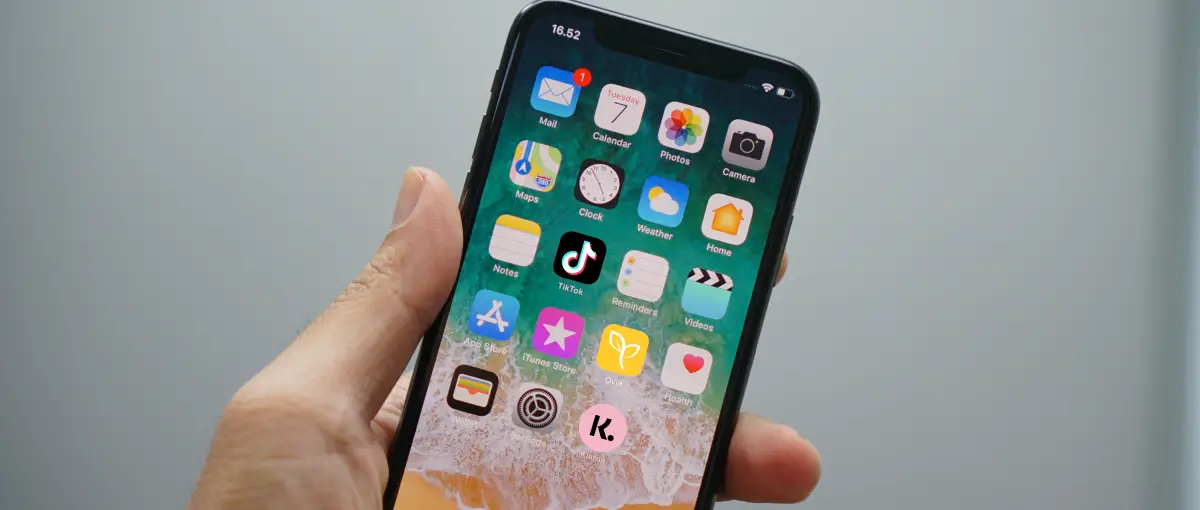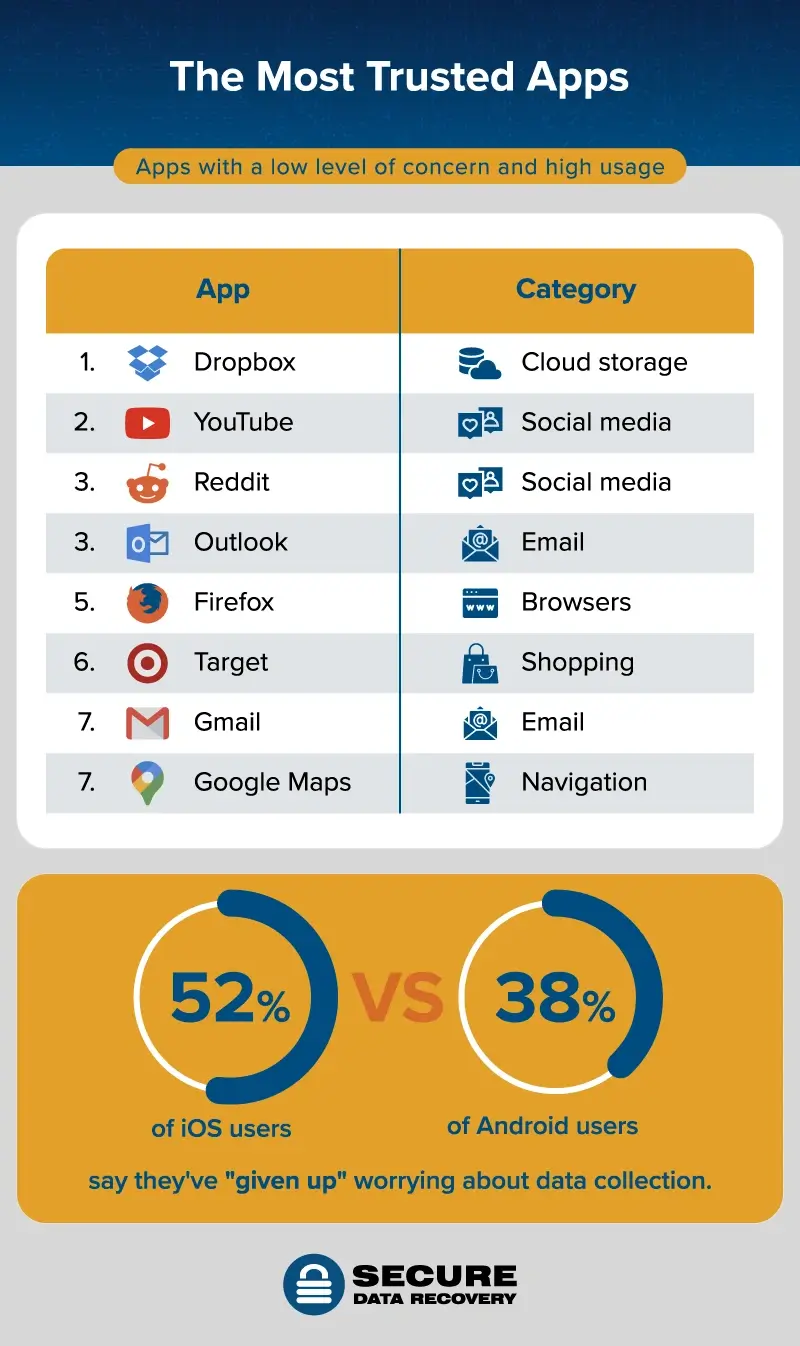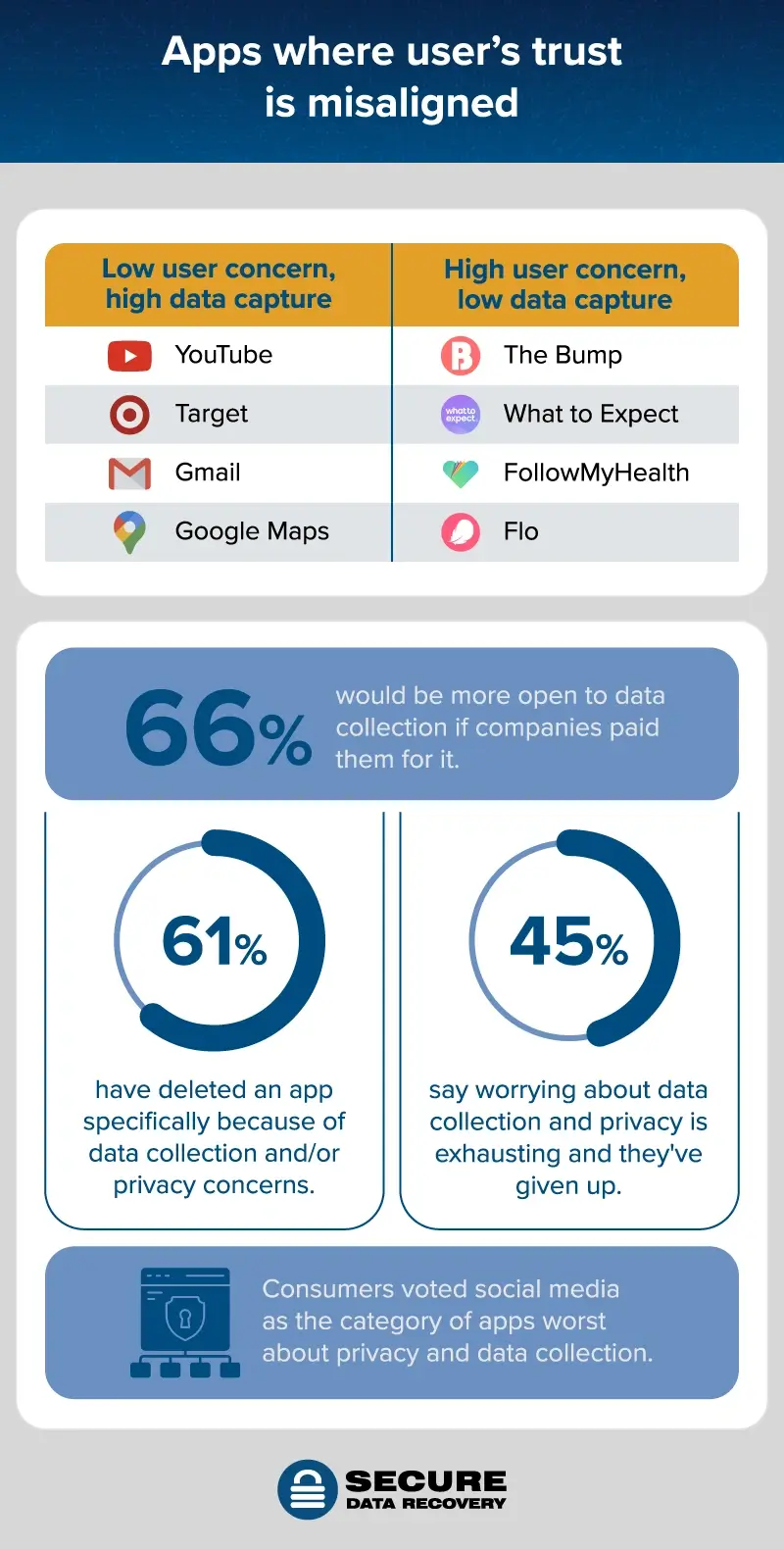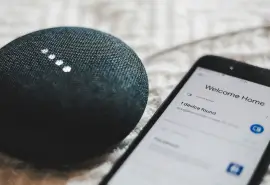Downloading an app on your phone only takes a few clicks. Uploading your personal information and creating a password is just as easy. While the process can seem like a no-brainer, you need to consider what types of data you’re agreeing to compromise. From your email address to your exact location, apps may collect and possibly distribute this data.
Now we’re more aware than ever before of how much data is collected from our devices. However, do people really care?
To find out how Americans feel about data tracking, we surveyed 918 Americans about the apps they trust most and least. Then we combined the data with a Surfshark analysis that assesses 14 types of data collection, ranging from financial information to search history to location.
The apps we analyzed are some of the most downloaded in the US. We looked at each app individually and also categorized them to find out which category of apps users trust most. We found out if Americans’ data tracking concerns accurately aligned with how much they actually should be concerned.
Key takeaways
- Women’s health apps are the least trusted in America.
- Home security and dating apps also ranked very high for consumer concern.
- Because of data collection and/or privacy concerns, 61% have deleted a specific app.
- If companies paid them for it, 66% would be more open to data collection.
The apps Americans are most concerned about
With an endless amount of apps you can download on your phone, you can find an app for everything and everyone. Not only are apps diverse, but so are users and their habits. You might give full access to your personal data to some apps while restricting others. Those you give data to you likely trust, for whatever reason, more than others.
So we were curious what apps Americans trusted and those they didn’t. Our respondents were most concerned about women’s health apps tracking their data. Interestingly, more people reported having concerns with these apps than people who actually reported using the apps. With concerns outweighing use, it made us wonder whether data tracking is holding women back from using popular women’s health apps.
Among the popular women’s health apps, period and pregnancy trackers take up 5 out of the top 10 spots on the least trusted apps list. Topping the list at number one is Ovia, a pregnancy and baby tracking app that beat out banking, dating, and social media apps in terms of distrust.
Not only do women’s health apps have people concerned about the security of their data, but home security apps raise similar concerns. These apps are marketed to make you feel protected and secure, but Americans’ revealed that many of these apps actually make them feel concerned about the amount of data they track. Both of the home security apps we looked at Nest and Ring, ranked in the top 10 list of apps users are most concerned about.
Aside from women’s health and home security apps, we looked at the five categories below and determined the app users are most concerned about in each:
- Social media: TikTok
- Women’s health: Ovia
- Dating: Hinge
- Payment: Cash App
- Shopping: Klarna
The apps Americans are least concerned about
You might give some apps the permission to gather your data without a second thought, and you’re not alone. Our respondents also noted what apps they trust most with their sensitive information. Coming in at number one, Dropbox, a cloud storage app, had the lowest concern level from users for the data it tracks. Also on the list are two social media apps, YouTube and Reddit, and email apps, Outlook and Gmail. Here’s a look at the eight apps that we designated as low concern because less than 40% of users expressed concern about their data capture:
Interestingly, the type of cell phone you own can reveal how aware you are about app data collection and privacy. More Android users (58%) described themselves as “very conscientious” about app use than iOS users (44%), and the effort shows. Over half (52%) of iOS users say they’ve “given up” worrying about data collection, as opposed to only 38% of Android users claiming to do so.
Apps users should be more concerned about
Taking a trip through the data tracking section in the app store will show you just how much data an app will track if you download it. Next time you’re going to download an app, you may be shocked to find out what data the app will track, and some of the information may have you questioning, “Why?”
We don’t know why users are less concerned about data tracking and privacy with some apps and more concerned with others. However, many popular apps warrant more concern than users give them because of the amount of data they actually collect.
Respondents may have put certain apps on the most trusted list, but some of those same apps actually track a high amount of their data. When you’re watching videos, replying to emails, or navigating your way around town, you may be shocked to find out the amount of data you’re giving out. Apps with similar uses made our list of the most trusted apps that capture a high amount of data from you. These four apps showed user's concerns were much lower than warranted:
- YouTube
- Target
- Gmail
- Google Maps
On the other hand, we found other apps that users have a high level of concern about even though the app itself only captures a low level of data from them. All apps on the list were health tracking apps, and specifically, several women’s health apps topped the list. Tracking a pregnancy, period, or storing health records, apparently makes users more cautious. Apps with these functions made our list of the apps where user concern was much higher than warranted:
- The Bump
- What to Expect
- FollowMyHealth
- Flo
How Americans feel about data collection gathered by apps
As the world continues to get more technologically advanced, it can seem impossible to always protect your data. Some have given up with 45% saying that worrying about data collection and privacy is exhausting so they don’t bother.
Of course, one way to avoid data collection is to simply delete the app or never use it in the first place. Of our respondents, 3 in 5 Americans say they have deleted an app specifically because of data collection and/or privacy concerns. On the other hand, the right price could ease the concerns about data collection for Americans. Over half (66%) say they would be more open to data collection if companies paid them for it.
Some of the most popular apps that people download according to the Apple App Store are social media apps. Although users are aware of the permissions they give out regarding their data, they don’t seem to mind it. Along with its popularity, social media was voted worst for data privacy and data collection by consumers. The banking category, which includes all apps that handle finances, was ranked as the best.
Conclusion
Americans’ concern levels about data tracking depend on the app they’re using. Some apps are more concerning than others to users, but their level of concern doesn’t always align with the amount of data that the app tracks. In some cases, users have a lot of trust in apps that track a high amount of data from them.
While it can be frustrating to worry about data tracking you can take precautions to minimize the data you share with third-parties. In a digital age, you should also make sure to back up any essential data and know your data recovery options in the event of an emergency.
Methodology
On January 1, 2023, we surveyed 918 people across the United States on the Prolific online research platform, asking about the apps they trust most and least. We combined the survey responses with an analysis done by Surfshark that looked at a comprehensive list of apps in different categories and checked what kind of data they collect from users by looking at the Privacy Details section of each on the Apple App Store. The categories they looked at were contact info, health and fitness, financial info, location, sensitive info, contacts, user content, browsing history, search history, identifiers, purchases, usage data, diagnostics, and other data. For apps not on the Surfshark analysis, used the same process to score. After the data had revealed which categories of apps collect the most segments of data from their users, we compared that to the survey responses to see how the apps Americans trust least with their data are aligned with those that collect the most data from the user.
Of our respondents, 48% identified as female, 50% as male and 2% non-binary. Respondents' ages ranged from 18 - 77 years old; 21% Gen Z, 48% millennials, 22% Gen X, and 9% Baby Boomers.










